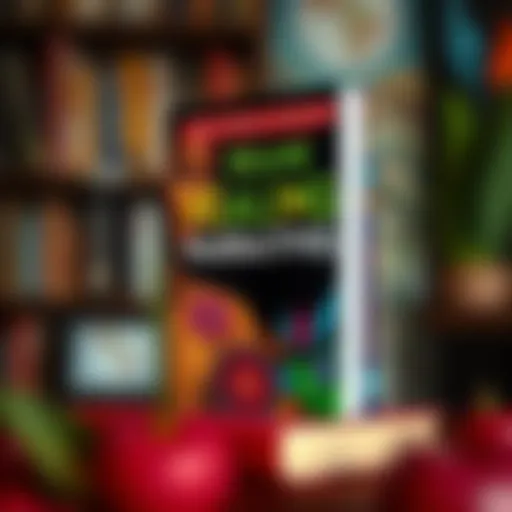Books for Personal Growth: Insights and Strategies


Intro
Books hold a special place in the realm of personal growth. They serve as mirrors reflecting not just the worlds we inhabit, but also the potential we often overlook within ourselves. Whether it’s a sturdy classic, like Pride and Prejudice, or a contemporary guide such as Atomic Habits, literature offers invaluable lessons that can help cultivate wisdom, skill, and perspective.
In recent times, personal development has blossomed into an expansive field, shaped by the ideas of many authors across diverse genres. From self-help to memoirs, the literature encourages introspection, offers actionable insights, and provides a step-by-step pathway to navigate the complexities of personal evolution. Books become not just a source of knowledge but a toolkit for transformation.
In this article, we will journey through various genres that harbor wisdom conducive to personal growth. We will highlight key themes and provide actionable takeaways for the curious minds eager to enhance their skill sets and overall outlook on life. Let's embark on this literary exploration together.
Preamble to Personal Development Literature
Personal development literature serves as a crucial cornerstone in our quest for growth. This body of work encompasses a wide range of genres, focusing on self-improvement, introspection, and the cultivation of skills. At its core, personal development literature guides individuals through transformations, both profound and subtle, that can significantly alter their life trajectories. The transformative power of words has the ability to inspire and motivate, functioning as a beacon in moments of uncertainty.
Defining Personal Development
Personal development can be somewhat elusive when attempting to put it into a tidy definition. Essentially, it refers to the ongoing process of self-improvement in various areas of life. This can range from enhancing one’s skills and knowledge to nurturing emotional well-being and improving relationships. Think of it as tending a garden—each individual element requires attention, care, and sometimes, a reevaluation of what blooms best.
To truly understand personal development, one might think of it as a holistic approach. It’s not just about climbing the corporate ladder or hitting fitness goals. Instead, it incorporates an array of dimensions including emotional, intellectual, and even spiritual growth. In this light, personal development literature provides various pathways, helping readers define their own goals and measure their progress along this expansive journey.
The Role of Literature in Personal Growth
Literature has long held a mirror up to the human experience, capturing both the mundane and the extraordinary aspects of life. When it comes to personal growth, books act as guides that illuminate otherwise dark paths. The narratives and lessons found within these pages resonate with readers in profound ways. Books can transfer knowledge, share life experiences, and propose frameworks for tackling life’s challenges.
Moreover, they offer a space for reflection; reading about others’ journeys can prompt individuals to evaluate their own lives in new contexts. A case in point: when someone reads about resilience in Victor Frankl’s "Man's Search for Meaning," they're not just absorbing information; they're reflecting on how they face adversity in their own lives. This reflective process can catalyze enhancing self-awareness, and ultimately, growth.
Literature is not just an escape, it's an exploration—of one’s inner self, the world around, and the interconnectedness of experiences.
Every book has something to impart, whether it’s a practical strategy or a broader perspective on life. In fact, the richness of personal development literature lies in its diversity. Whether one is drawn to self-help, biographies, or psychological theories, each genre can contribute unique insights to one’s personal journey. By engaging with these texts, readers can sift through the noise of everyday life, discover actionable takeaways, and enrich their growth experiences.
In summary, personal development literature offers a wealth of pathways to navigate the complexities of life. It allows individuals to reflect, learn, and ultimately evolve into their best selves. As we explore various categories of books throughout this article, the importance of seeking out relevant literature becomes ever clearer. Each text not only informs but shapes the personal growth journey in a myriad of ways.
Categories of Books for Development
In the vast realm of personal development, books serve as invaluable resources. They provide insights, methods, and pathways to growth that can help individuals navigate life's complexities. Categorizing these works enables readers to hone in on the material that resonates most with their circumstances and goals. Understanding these categories not only streamlines the process of searching for guidance but also broadens one's perspective on self-improvement. Each genre offers its unique lens through which personal growth can be attained.
Self-Help Books
Self-help books are like the Swiss Army knives of personal development. They cover a wide range of topics, from improving relationships to achieving financial independence. These books often include actionable advice, personal anecdotes, and exercises intended to foster change. Most notably, they serve as companions on the journey of self-discovery and motivational guides, helping readers understand their own circumstances more deeply.
One key strength of self-help literature is its accessibility. Writers like Tony Robbins and Marie Forleo distill complex psychological concepts into relatable narratives. This allows readers, regardless of their prior knowledge, to recognize their own potential for change. A particularly popular title, The Subtle Art of Not Giving a Fck* by Mark Manson, encourages individuals to think critically about their values, pushing them to reassess what is truly worth their time and effort.
"Self-help books serve as mirrors reflecting our hidden aspirations and obstacles."
Biographies and Memoirs
When it comes to personal growth, sometimes the best teachers are those who have walked the walk. Biographies and memoirs of notable figures provide not just a glimpse into the lives of others, but deep insights into overcoming struggles and achieving greatness. From Nelson Mandela’s Long Walk to Freedom to Michelle Obama’s Becoming, these works often portray journeys filled with resilience, passion, and personal transformation.
These narratives allow readers to see the real-life applications of principles often articulated in self-help books. They can learn about the histories that shape people’s values, the setbacks they faced, and the grit required to persevere. Absorbing these stories can inspire readers to push past their own boundaries, emphasizing that change is possible at any stage of life.
Philosophical Works
Philosophy, while sometimes considered abstract, provides rich fodder for personal development. Texts by thinkers such as Friedrich Nietzsche and Simone de Beauvoir not only challenge our values but also provoke reflection about purpose and existence. These works encourage readers to explore foundational questions: What does it mean to lead a good life? How do our duties to others shape our freedom?
By grappling with philosophical texts, readers can gain insights into their own beliefs and desires. The process can aid them in forming a more coherent worldview and develop nuanced thinking abilities that branch into other areas of their lives. Notable examples like Meditations by Marcus Aurelius offer timeless wisdom on resilience and attitude, emphasizing the idea that we often have more control over our thoughts than our circumstances.
Business and Leadership
Books focused on business and leadership bridge the gap between personal and professional development. Jim Collins’s Good to Great demystifies what makes some companies exceptional, while Simon Sinek’s Start with Why advocates for purpose-driven leadership. These texts not only provide strategies for career success but also emphasize the importance of vision and influence in everyday leadership.
For professionals, this genre often encourages developing a growth mindset and understanding emotional intelligence, both vital for navigating the complexities of teamwork and management. The theories and models articulated in these works can often be translated into personal life strategies, providing a broader toolkit for achieving life goals.
Psychology and Human Behavior
Books on psychology delve into the human psyche, dishing out insights that can be profoundly transformative. Authors like Daniel Kahneman and Emily Nagoski provide readers with a deeper understanding of motivation, perception, and emotional well-being. The intricacies explained in Thinking, Fast and Slow and Come as You Are illuminate fundamental aspects of human experience and decision-making.


By understanding the various psychological influences that govern behavior, individuals can better navigate their own habits and responses to situations. This can lead to improved interpersonal relationships and a more profound appreciation of oneself. With the guidance of these texts, readers can shift their perspectives from being passive recipients of circumstances to proactive creators of their own narratives.
In summary, exploring different categories of books for development equips individuals with diverse strategies and insights tailored to their unique journeys. Each genre has its merits, and by integrating knowledge from multiple sources, one can cultivate a holistic approach to personal growth.
Essential Themes in Development Literature
In the realm of personal development, certain themes consistently emerge, acting as the foundation upon which many self-help books and transformative narratives are built. These themes function like cornerstones, giving structure to the vast landscape of literature available for those on the quest for self-improvement. Each one addresses vital aspects of human experience and growth, making them essential for anyone looking to enhance their life.
Mindset and Attitude
When it comes to personal growth, mindset and attitude are everything. Think of this as the lens through which we view our surroundings and ourselves. A positive mindset often leads to increased motivation and resilience in the face of challenges. This concept ties closely to Carol S. Dweck's research on growth versus fixed mindsets. For instance, those who believe they can improve their abilities are more likely to embrace challenges, learn from feedback, and persist despite setbacks.
Having a constructive attitude opens the door to a myriad of possibilities. This isn’t just about staying optimistic; it involves a conscientious effort to cultivate an openness to learning and change. By actively reframing negative thoughts, we can steer our internal dialogue toward a more empowering narrative. Books like "Mindset: The New Psychology of Success" by Dweck provide rich insights into these dynamics, making a compelling case for the pivotal role mindset plays in achieving one’s potential.
Resilience and Overcoming Adversity
Life is peppered with obstacles and hardships. Resilience is the ability to bounce back from these tough times. Consider Victor Frankl’s work, "Man's Search for Meaning,” which underscores how finding purpose can lead individuals to overcome even the most harrowing trials. Resilience can be nurtured through various practices, such as developing a strong support network and adopting flexibility in thought.
This theme tells a powerful story of human perseverance. The literature on resilience often reinforces the idea that challenges can offer valuable lessons. It's about staying the course, adapting when things go awry, and learning to see setbacks as stepping stones rather than roadblocks. Books covering this theme empower readers to build their fortitude and reframe how they approach adversity.
Goal Setting and Achievement
"Setting goals is the first step in turning the invisible into the visible.” This statement resonates with many who understand that it’s not just about dreaming big, but also about taking actionable steps towards those dreams. Goal setting is a structured way to create a roadmap for one’s aspirations. This theme teaches that having clear, measurable goals can significantly increase achievements.
Consider the SMART Criteria—Specific, Measurable, Achievable, Relevant, and Time-bound. Many authors emphasize these principles as keys to effective goal setting like Brian Tracy’s "Eat That Frog!" which focuses on prioritizing tasks to make incremental progress toward larger objectives.
Incorporating these techniques not only provides clarity but also helps maintain focus, turning ambition into reality. As each goal is achieved, it fosters a sense of accomplishment and motivates the individual to aim even higher.
Emotional Intelligence
Often seen as the tipping point between average and exceptional performance in both personal and professional realms, emotional intelligence (EQ) is crucial for fostering positive relationships and navigating social complexities. Daniel Goleman’s framework on EQ illustrates how self-awareness, self-regulation, motivation, empathy, and social skills contribute toward a more connected existence.
A high EQ enables individuals to understand their own emotions and those of others, leading to improved interpersonal communication and conflict resolution. In today’s fast-paced world, these skills aren’t just beneficial; they’re essential. Literature that delves into emotional intelligence encourages readers to enhance their social capabilities, leading to profound personal transformation.
In summary, these essential themes—mindset and attitude, resilience, goal setting, and emotional intelligence—serve as guiding lights for those engaging with personal development literature. They not only offer frameworks for understanding ourselves but also provide practical strategies for navigating challenges. By exploring these topics, readers can equip themselves with the tools necessary for meaningful growth and transformation.
Key Authors and Their Contributions
The realm of personal development literature is painted with the unique strokes of various authors, each bringing their own philosophies and insights to the table. These key authors don't simply write; they shape the narrative of countless individuals, providing tools and frameworks that inspire change. When delving into their works, readers are not just consuming words but rather engaging in a dialogue of self-discovery and transformation. The emphasis here is to understand how these authors' contributions create pathways for personal growth and why their principles resonate distinctly across diverse audiences.
Stephen R. Covey
Stephen R. Covey’s influence on personal development is nothing short of monumental. His book, "The 7 Habits of Highly Effective People," does more than present a checklist of habits; it offers a holistic approach to personal change. Covey encourages readers to reflect on their core values and principles, urging them to shift their focus from mere efficiency to effectiveness in both personal and professional realms.
Covey's emphasis on proactive behavior, as seen in the first habit, sets the stage for personal responsibility. He posits that individuals can change their circumstances through mindful choices. This perspective shifts the onus of change onto the reader, fostering a sense of empowerment. The practical frameworks and principles he lays out serve as blueprints for living a more intentional life.
Brené Brown
In a landscape often filled with forthright motivational strategies, Brené Brown introduces a refreshing emphasis on vulnerability and authenticity in her works. Her research tackles the myths surrounding strength, showing that vulnerability is not weakness but instead a pathway to deep personal connection and bravery. In her landmark book "Daring Greatly," Brown highlights how embracing vulnerability creates what she calls "the courage to be imperfect."
Her insights encourage readers to dive deep into their emotional landscapes, fostering resilience and empathy. Beyond the academic research, Brown’s conversational tone makes her messages relatable, inviting individuals to view their struggles as shared human experiences. Readers learn that personal growth isn't just about achievements, it's about realizing our interconnectedness.
Malcolm Gladwell
Malcolm Gladwell's approach in books such as "Outliers" and "The Tipping Point" provides a cultural lens through which we can understand success and social dynamics. Gladwell challenges conventional wisdom, drawing connections between seemingly unrelated events to show how context influences outcomes. He emphasizes that success isn’t merely the result of individual talent; rather, it often results from a combination of factors including timing, effort, and the environment individuals find themselves in.
Through storytelling, Gladwell brilliantly articulates concepts such as the "10,000-Hour Rule," encouraging readers to appreciate the dedication behind mastery. His work invites individuals to reassess their views on hard work and achievement, blending compelling narratives with thought-provoking analysis that speaks to both the intellect and emotions of his audience.
Dale Carnegie
Dale Carnegie’s contribution to personal development is foundational, rooted in the understanding of human relations. In his classic work "How to Win Friends and Influence People," he provides timeless principles that revolve around communication skills and interpersonal connections. Carnegie’s advice transcends generational divides, remaining relevant in today’s digital landscapes where face-to-face interactions are dwindling.
Carnegie’s methods center on the importance of understanding others, building rapport, and articulating ideas in ways that resonate with them. His insights offer readers tools to navigate social challenges and foster relationships that can lead to personal and professional success. His emphasis on listening, empathy, and genuine interest in others still resonates strongly with readers looking to hone their interpersonal skills.


"Books are the quietest and most constant of friends; they are the most accessible and wisest of counselors, and the most patient of teachers."
The contributions of these authors are not just about ideas; they are about instilling a sense of possibility. Each author's insights serve as stepping stones in a broader journey of personal growth, equipping readers with frameworks, stories, and strategies that inspire action and reflection.
The Impact of Books on Personal Transformation
Books possess an inherent ability to influence lives, steering individuals toward paths they might never have considered otherwise. This transformative power is particularly pronounced in the realm of personal development. Engaging with a well-written text can inspire, challenge, and ultimately reframe a person's understanding of themselves and their potential. Each page turned can be a stepping stone on the journey to becoming more adept at navigating life's complexities.
The beauty of personal transformation through literature lies in its multifaceted impact. First off, it encourages introspection—a critical component for growth. Readers confront their beliefs, values, and habits, catalyzing a desire for change. Furthermore, literature offers practical strategies and frameworks, presenting diverse perspectives that can lead to new implementations in daily life.
Here are some key elements that delineate the significance of this topic:
- Catalyst for Change: Engaging with literature often acts as a prompt for reconsidering one’s life choices. It can push individuals towards adopting healthier habits or professional strategies they hadn’t previously entertained.
- Skill Development: Many personal development books offer specific advice, actionable steps, or exercises that can sharpen skills—whether emotional intelligence, time management, or leadership abilities.
- Broader Understanding: Literature allows readers to explore human experiences beyond their own, cultivating empathy. This broader understanding can translate into improved relationships and communication skills.
Ultimately, the impact of books goes far beyond just acquiring knowledge; it’s about fostering a sustainable change that resonates through personal and professional spheres.
"A book is a dream that you hold in your hand." – Neil Gaiman
Case Studies of Change
To illustrate the profound effects of literature on personal transformation, consideration of real-life instances provides invaluable insights. Consider a young professional, previously struggling with self-doubt. After reading The Gifts of Imperfection by Brené Brown, this individual began to internalize the concepts of vulnerability and authenticity. They found themselves engaging more openly with colleagues and friends, slowly shedding the constraint of perfectionist ideals. This shift not only improved their work environment but also deepened their personal connections, leading to a better overall quality of life.
Another compelling example can involve someone undergoing career changes. Reading books such as What Color Is Your Parachute? by Richard N. Bolles equipped a disgruntled office worker with the tools to reflect on their true interests and skills. In the process, they discovered a passion for entrepreneurship, leading them to pursue a fulfilling career that aligned with their innate talents and aspirations.
These cases underscore not just the relevance but also the tangible benefits of reading in environments where personal change is paramount. Literature offers a mirror, reflecting our potential back to us, often igniting the drive to make actionable changes.
Long-Term Effects of Reading
Diving into the long-term effects of engaging with personal development literature reveals the cumulative nature of sustained reading habits. When books are revisited, insights can morph over time as readers evolve in their journeys.
Here are some notable long-term impacts:
- Cognitive Growth: Regular reading sharpens critical thinking and problem-solving skills. When individuals consistently expose themselves to varying viewpoints and scenarios through books, they develop a more refined ability to analyze and deduce.
- Increased Empathy and Understanding: Literature acts as a bridge, connecting individuals to lives different from their own. Over time, this fosters a deepened sense of empathy, enhancing interpersonal relationships and communication.
- Sustained Engagement with Personal Growth: Long-term readers often find themselves developing a growth mindset. As they glean wisdom from diverse texts, they internalize the notion of continual improvement, leading to an ongoing quest for knowledge and self-betterment.
Through a sustained iterative process of reading, individuals begin to weave the lessons learned into the very fabric of their lives, affecting decisions, relationships, and personal satisfaction. The narrative built from these experiences collaborates to create a more enriched, capable self.
In summary, the impact of books on personal transformation is profound and multi-layered. The journey of personal development through literature is unending, with each new chapter opening doors to greater understanding, fostering success and fulfillment in life.
Accessible Literature: The Role of Summaries
In today’s fast-paced world, the concept of accessible literature holds significant weight, especially when it comes to personal development. The soaring volumes of information available can be daunting. For many, navigating this myriad of texts can feel like wading through a swamp without clear pathways. Summaries serve as a beacon, cutting through the noise and providing a clearer route toward meaningful insights and personal growth.
Summaries as Learning Tools
Summaries act as a bridge between complex works and readers who may not have the time or energy to immerse fully. When someone comes across a hefty book filled with rigorous theories or intricate details, a well-crafted summary can distill the essence into digestible portions. Here are several benefits:
- Time Efficiency: With countless demands on one's time, summaries can highlight key concepts without getting lost in the weeds.
- Enhanced Comprehension: For those who may struggle with certain topics, a synopsis can clarify the main ideas, enabling better understanding.
- Retention and Recall: Brief summaries can aid memory retention, making it easier to recall the core lessons from a text later on.
Moreover, summaries don’t just serve as shortcuts; they sharpen critical thinking. By engaging with a summary, readers often have the space to reflect on the ideas presented and to apply them practically. This can ignite the kind of mental workouts that fuel genuine personal development.
Navigating a Vast Literature Landscape
The landscape of personal development literature resembles a sprawling library, filled with diverse genres and voices. For the unseasoned reader, it can be a bit like finding a needle in a haystack.
Navigating this terrain effectively can be aided by summaries in a few ways:
- Guided Exploration: Summaries allow readers to explore various topics without the weight of fully committing to lengthy books. This flexibility permits individuals to dip their toes into new ideas and perspectives freely.
- Connecting Dots: A summary can serve as a pivotal tool for connecting ideas across various works. By summarizing key concepts from multiple sources, readers develop a broader view, which can lead to rich, interwoven understanding.
- Prioritizing Reads: With insight gleaned from a summary, readers can better determine which books warrant their full attention. They can identify what suits their current needs or interests, leading to more informed reading choices.
In short, the role of summaries in personal development literature can't be overstated. They not only bridge accessibility gaps but also enhance understanding and retention of vital concepts. As readers continue to explore, these concise previews and insights pave the way toward deeper learning and greater self-awareness.
Digital Resources for Development Reading
In an age where digital innovation permeates various facets of life, the assimilation of technology into personal development literature is not just a trend; it is a necessary evolution. The importance of digital resources in the realm of personal growth cannot be overstated. They provide accessibility to enormous libraries of knowledge, which may have previously been confined to physical books or niche communities.


By leveraging digital platforms, anyone, regardless of their schedule, can dive into a world of transformative literature. Digital resources, like e-books and audiobooks, break down traditional barriers. This means you don’t need to camp out at a bookstore or library; you can access personal development insights from the palm of your hand, whether at home, during a commute, or while waiting in line at the grocery store.
E-Books and Audiobooks
E-books and audiobooks have become cornerstones for modern readers looking to enhance their personal development journey. They offer unique advantages that traditional print books often cannot match:
- Portability: You can carry a multitude of e-books or dozens of audiobooks on one device, making it easy to switch between titles based on your needs or moods.
- Accessibility: Many e-book platforms have features that aid readers with different needs, such as text-to-speech or adjustable font sizes. This inclusion widens the audience, making personal development literature accessible to individuals with visual impairments or reading difficulties.
- Interactive Features: E-books often come with hyperlinks to additional resources, definitions, or related content, enriching the reading experience and enabling deeper dives into complex topics.
- Affordable Options: Digital formats frequently offer lower prices than print versions, putting high-quality personal development content within reach for many.
Audiobooks, in particular, have risen in popularity due to their convenience. For example, you can listen to a renowned motivational speaker while jogging or folding laundry, turning mundane tasks into opportunities for learning and growth. This unique quality of multitasking can significantly enhance your knowledge-acquisition journey, turning otherwise unproductive times into valuable growth experiences.
Online Book Summaries Platforms
Another significant trend worth exploring is the rise of online book summary platforms. Services like Blinkist or GetAbstract provide condensed versions of well-known personal development books, allowing readers to absorb key concepts quickly. This can take the pressure off overwhelmed readers who might find it daunting to sift through voluminous content. Here are some compelling reasons to consider these platforms:
- Time Efficiency: Life can feel like a never-ending race. Book summaries condense critical insights, allowing readers to grasp essential points in less than 30 minutes.
- Diverse Perspectives: Many summary services cover a wide array of books, ensuring that you aren't limited to just bestsellers or classics. This broadens your understanding of various strategies and philosophies in personal development.
- Previewing New Books: Summaries provide an effective way to vet whether a full book will resonate with you before committing the time and money to read it.
In summary, digital resources offer unprecedented access to personal development literature, breaking down barriers, and encouraging a culture of learning that fits seamlessly into daily life. Through e-books, audiobooks, and summarization platforms, individuals can now explore myriad paths to personal growth at their own pace.
Challenges in Personal Development Reading
Reading for personal development offers a wealth of benefits, yet it also comes with distinct challenges. Understanding these difficulties can empower readers, allowing them to navigate the vast landscape of literature effectively. The broad appeal of self-improvement literature means there's a sea of information, each with its own angle. For students, professionals, and avid readers, recognizing potential pitfalls in their reading journey is essential.
Information Overload
In today's digital age, information is more abundant than ever. Consider this: the sheer volume of books, articles, and online resources can quickly overwhelm anyone aiming to delve into personal development. It's almost as if you step into a bookstore only to find yourself engulfed by endless shelves of possibilities, each whispering promises of transformation.
The consequence? The term "analysis paralysis" comes to mind. When faced with too many choices, making any choice becomes daunting. This can lead to readers bouncing from one book to the next without fully digesting the insights. To tackle this, it’s vital to approach reading with a clear intention. Here are some strategies that could help mitigate information overload:
- Set Specific Goals: Identify what you wish to achieve through reading. Whether it's enhancing emotional intelligence or mastering goal-setting techniques, having a targeted approach can narrow down your focus.
- Choose Quality Over Quantity: Instead of racing through numerous titles, opting for a few highly recommended works can yield greater benefits. Consider diving deeply into a few books rather than skimming through many.
- Regular Breaks: Allow time to reflect on what you've read. This downtime can be critical for internalizing concepts and applying them in daily life.
Navigating Misinformation
As much as there is beneficial content in personal development literature, misinformation lurks in the shadows as well. In today’s age of information, we must constantly discern what’s credible versus what’s just noise. Not every author or source is created equal. Some might present outdated ideas disguised as fresh insights, or worse, harmful advice that could lead you astray.
To effectively separate wheat from chaff, consider the following:
- Check Credentials: Always look into the qualifications of authors. Their background should inform their ability to give advice on personal growth. Are they recognized in their field? Have they provided evidence-based insights?
- Read Reviews and Critiques: Seek out multiple perspectives on a book before diving in. Sometimes the reviews hold valuable information, which can either increase your interest or act as a red flag.
- Stay Updated: Subscribe to journals or newsletters focused on personal development. These often debunk myths and offer nuanced perspectives that books might gloss over.
“The mind is like a parachute. It doesn't work if it isn't open.” – Frank Zappa
Ultimately, engaging with personal development literature requires diligence and critical thinking. By being aware of challenges such as information overload and misinformation, readers can create a richer, more transformative experience in their personal growth trajectories.
Culmination: The Role of Books in Lifelong Development
Books possess a unique power that goes beyond mere entertainment; they serve as vital tools for lifelong growth and enlightenment. The act of reading extends far beyond just flipping through pages; it encourages deep reflection, critical thinking, and nurtures the essence of learning at every stage of life. Emphasizing this role, the article discusses how literature in varied genres provides pathways for individuals to explore their potential, tackle challenges, and foster personal evolution.
Engagement with books sharpens our understanding of the world and introduces new perspectives. For example, a biography can illuminate the trials of a historical figure, making one's own challenges appear more surmountable. Self-help books frequently offer practical strategies, which, if methodically applied, can lead individuals to profound transformations. Each literary piece contributes a brushstroke to the vast canvas of our lives.
Books also serve as companions in our journey through different life stages. As we grow and evolve, they provide context and frameworks with which to interpret experiences and insights. This capability of books influences not just individual lives but can ripple outwards, impacting families, communities, and ultimately society. In today’s fast-paced world, two key aspects emerge prominently:
- Reading habits: Reflecting on how we engage with literature can help separate the wheat from the chaff. Understanding the motivations behind our choices can lead to more valuable reading experiences.
- Future explorations: This forward gaze towards evolving literature opens doors to additional insights, integrating contemporary issues, cultural shifts, and technological advancements.
"Books are a uniquely portable magic." – Stephen King
Reassessing Our Reading Habits
In reassessing our reading practices, we must confront the question: Are we reading with intention or simply consuming whatever comes our way? Many people read passively, allowing external influences to dictate their choices, which can lead to a disconnect between what we read and what we truly need for our personal development.
By consciously selecting literature that resonates with our goals or challenges, we cultivate a more fruitful reading experience. A practical approach could involve establishing a reading list based on specific areas for growth, whether those pertain to emotional intelligence, leadership skills, or resilience. Keeping track of insights and reflections through a reading journal can further enhance this process, allowing us to engage deeply with the material.
Encouragingly, we can also explore diverse formats and genres, breaking out of any cozy but confining literary habits we've settled into. Trying out essays, academic works, and various non-fiction narratives can widen our perspectives and complement more traditional self-help texts. This diversification not only enriches our knowledge but can also lead to unexpected connections and insights.
Future Directions in Personal Development Literature
The landscape of personal development literature is in constant flux, adapting to the challenges and needs unique to each generation. As we peer into the future, a few promising directions emerge:
- Digital Transformation: With advancements in technology, literature is becoming more accessible than ever. E-books, audiobooks, and interactive content are reshaping how we interact with texts, catering to varying learning styles and lifestyles.
- Introspection and Authenticity: There's a growing focus within literature on authenticity, encouraging readers to embrace vulnerability and a deeper introspection of self. This may lead to more raw and honest accounts from authors, fostering genuine connections with audiences.
- Interdisciplinary Approaches: The integration of insights from fields such as neuroscience, sociology, and behavioral economics into personal development literature is on the rise. This amalgamation can provide readers with a holistic understanding of challenges they face.
- Community and Collective Growth: Greater emphasis can also be placed on collective journeys and community support in personal development. As shared experiences become more recognized as powerful catalysts for growth, literature may increasingly explore collaborative narratives.
Ultimately, the role of books in our lives remains paramount. They not only ignite self-discovery but also empower individuals to pave their unique paths toward personal growth. With intentional reading habits and an openness to the evolving literary landscape, we position ourselves to harness the full potential of literature as a resource for lifelong development.















